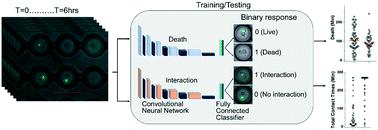Our official English website, www.x-mol.net, welcomes your
feedback! (Note: you will need to create a separate account there.)
Machine learning-aided quantification of antibody-based cancer immunotherapy by natural killer cells in microfluidic droplets.
Lab on a Chip ( IF 6.1 ) Pub Date : 2020-05-14 , DOI: 10.1039/d0lc00158a Saheli Sarkar 1 , Wenjing Kang , Songyao Jiang , Kunpeng Li , Somak Ray , Ed Luther , Alexander R Ivanov , Yun Fu , Tania Konry
Lab on a Chip ( IF 6.1 ) Pub Date : 2020-05-14 , DOI: 10.1039/d0lc00158a Saheli Sarkar 1 , Wenjing Kang , Songyao Jiang , Kunpeng Li , Somak Ray , Ed Luther , Alexander R Ivanov , Yun Fu , Tania Konry
Affiliation

|
Natural killer (NK) cells have emerged as an effective alternative option to T cell-based immunotherapies, particularly against liquid (hematologic) tumors. However, the effectiveness of NK cell therapy has been less than optimal for solid tumors, partly due to the heterogeneity in target interaction leading to variable anti-tumor cytotoxicity. This paper describes a microfluidic droplet-based cytotoxicity assay for quantitative comparison of immunotherapeutic NK-92 cell interaction with various types of target cells. Machine learning algorithms were developed to assess the dynamics of individual effector-target cell pair conjugation and target death in droplets in a semi-automated manner. Our results showed that while short contacts were sufficient to induce potent killing of hematological cancer cells, long-lasting stable conjugation with NK-92 cells was unable to kill HER2+ solid tumor cells (SKOV3, SKBR3) significantly. NK-92 cells that were engineered to express FcγRIII (CD16) mediated antibody-dependent cellular cytotoxicity (ADCC) selectively against HER2+ cells upon addition of Herceptin (trastuzumab). The requirement of CD16, Herceptin and specific pre-incubation temperature served as three inputs to generate a molecular logic function with HER2+ cell death as the output. Mass proteomic analysis of the two effector cell lines suggested differential changes in adhesion, exocytosis, metabolism, transport and activation of upstream regulators and cytotoxicity mediators, which can be utilized to regulate specific functionalities of NK-92 cells in future. These results suggest that this semi-automated single cell assay can reveal the variability and functional potency of NK cells and may be used to optimize immunotherapeutic efficacy for preclinical analyses.
中文翻译:

机器学习辅助对微流体液滴中自然杀伤细胞基于抗体的癌症免疫疗法进行定量。
自然杀伤 (NK) 细胞已成为基于 T 细胞的免疫疗法的有效替代选择,特别是针对液体(血液)肿瘤。然而,NK 细胞疗法对于实体瘤的效果并不理想,部分原因是靶点相互作用的异质性导致不同的抗肿瘤细胞毒性。本文描述了一种基于微流体液滴的细胞毒性测定,用于定量比较免疫治疗性 NK-92 细胞与各种类型靶细胞的相互作用。开发了机器学习算法,以半自动方式评估个体效应器-靶细胞对缀合的动态以及液滴中的靶标死亡。我们的结果表明,虽然短时间接触足以诱导有效杀死血液癌细胞,但与 NK-92 细胞的长期稳定缀合无法显着杀死 HER2 +实体瘤细胞(SKOV3、SKBR3)。 NK-92 细胞经过工程改造,在添加赫赛汀(曲妥珠单抗)后可表达 FcγRIII (CD16) 介导的抗体依赖性细胞毒性 (ADCC),选择性针对 HER2 +细胞。 CD16、赫赛汀和特定预孵育温度的要求作为三个输入,生成分子逻辑函数,并以 HER2 +细胞死亡作为输出。对两种效应细胞系的大规模蛋白质组学分析表明,上游调节因子和细胞毒性介质的粘附、胞吐作用、代谢、运输和激活方面存在差异变化,这些变化可用于将来调节 NK-92 细胞的特定功能。 这些结果表明,这种半自动单细胞测定可以揭示 NK 细胞的变异性和功能效力,并可用于优化临床前分析的免疫治疗功效。
更新日期:2020-06-30
中文翻译:

机器学习辅助对微流体液滴中自然杀伤细胞基于抗体的癌症免疫疗法进行定量。
自然杀伤 (NK) 细胞已成为基于 T 细胞的免疫疗法的有效替代选择,特别是针对液体(血液)肿瘤。然而,NK 细胞疗法对于实体瘤的效果并不理想,部分原因是靶点相互作用的异质性导致不同的抗肿瘤细胞毒性。本文描述了一种基于微流体液滴的细胞毒性测定,用于定量比较免疫治疗性 NK-92 细胞与各种类型靶细胞的相互作用。开发了机器学习算法,以半自动方式评估个体效应器-靶细胞对缀合的动态以及液滴中的靶标死亡。我们的结果表明,虽然短时间接触足以诱导有效杀死血液癌细胞,但与 NK-92 细胞的长期稳定缀合无法显着杀死 HER2 +实体瘤细胞(SKOV3、SKBR3)。 NK-92 细胞经过工程改造,在添加赫赛汀(曲妥珠单抗)后可表达 FcγRIII (CD16) 介导的抗体依赖性细胞毒性 (ADCC),选择性针对 HER2 +细胞。 CD16、赫赛汀和特定预孵育温度的要求作为三个输入,生成分子逻辑函数,并以 HER2 +细胞死亡作为输出。对两种效应细胞系的大规模蛋白质组学分析表明,上游调节因子和细胞毒性介质的粘附、胞吐作用、代谢、运输和激活方面存在差异变化,这些变化可用于将来调节 NK-92 细胞的特定功能。 这些结果表明,这种半自动单细胞测定可以揭示 NK 细胞的变异性和功能效力,并可用于优化临床前分析的免疫治疗功效。











































 京公网安备 11010802027423号
京公网安备 11010802027423号